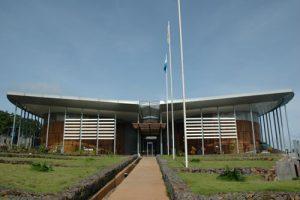
Special Court for Sierra Leone in Freetown.
UN Photo.
Speculation is mounting that the U.S. Department of State may close the Office of Global Criminal Justice (GCJ) following the reassignment of the head of the office, Todd Buchwald. This would be a major setback to efforts by the United States, and the broader international community, to hold accountable those responsible for genocide and crimes against humanity.
Created in 1997, GCJ has thrived under the leadership of senior diplomats charged with advancing efforts by international, regional, and domestic courts to prosecute war crimes, crimes against humanity, and genocide. The beneficiaries of this support and partnership include the International Criminal Court, International Criminal Tribunal for the Former Yugoslavia, International Criminal Tribunal for Rwanda, Extraordinary African Chamber (which prosecuted former Chadian dictator Hissène Habré), Special Court for Sierra Leone, and the Khmer Rouge Tribunal. Recently, the office has focused on helping to establish the Hybrid Court for South Sudan, and the new Special Criminal Court in the Central African Republic.
The team at GCJ goes beyond promoting international justice. They help actualize the ICC’s principle of complementarity: international courts should be a last resort, with the ultimate goal being that domestic courts are willing and equipped to prosecute crimes in their own territories.
“In addition to being an independent voice within the U.S. government on the importance of accountability for atrocities, and helping operationalize international courts, GCJ has done significant direct diplomacy in countries where mass atrocities are occurring. Those consultations actually moved the needle by supporting civil society in their demands for justice and pressuring governments to clean up their acts related to corruption in court systems and ICC cooperation.” – Enough Project Senior Policy Analyst Holly Dranginis.
The office, and the Ambassador-at-Large for War Crimes Issues who traditionally heads it, are critical to highlighting and elevating war crimes issues within U.S. government deliberations and leading U.S. efforts to bring criminals to justice. In addition to supporting various courts and tribunals, the office also runs the War Crimes Rewards Program, which offers up to five million dollars in exchange for information regarding individuals who have been charged with international crimes. The program led to the arrest and capture of individuals prosecuted by both the Rwanda and former Yugoslavia tribunals.
Closing the office would have dire practical and symbolic implications. The technical assistance provided by the Ambassador-at-Large and GCJ’s team of lawyers and diplomats is vital to nascent courts and tribunals, as well as to governments that are ill-equipped to prosecute war crimes domestically. Enough Project Director of Policy and Research Jon Temin said, “The Ambassador-at-Large often lives virtually on the road, traveling the globe to prod and cajole politicians and diplomats to prioritize justice and accountability. He or she is the United States’ chief proponent of these issues, inside government and out. That is a vital function that should not be terminated.”
Closing the office would also message to the world that accountability is a diminished priority for the Trump administration, that war criminals around the world have less to fear from the United States. At a time of enormous instability in the countries Enough focuses on – Sudan, South Sudan, Democratic Republic of Congo, Central African Republic – as well as more broadly, such messaging would be a setback to the hard-won hope held by people seeking justice, and be an ill-advised boost to those most responsible for mass violence.

